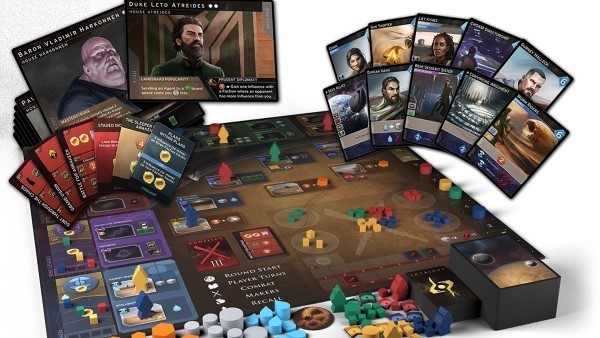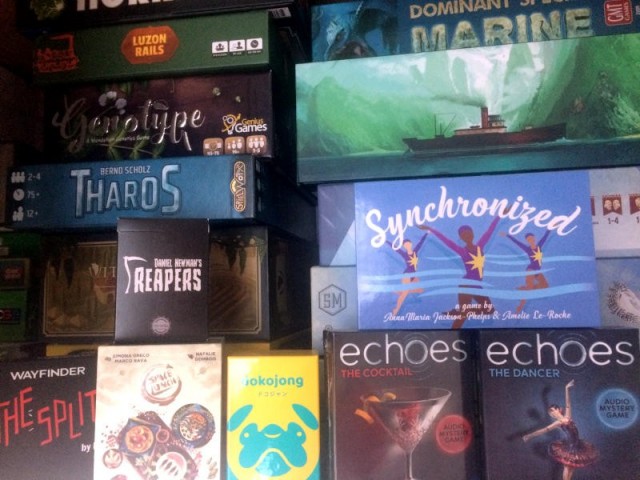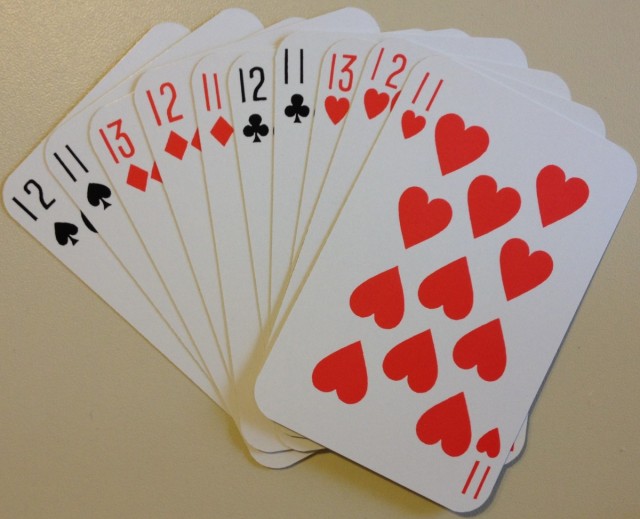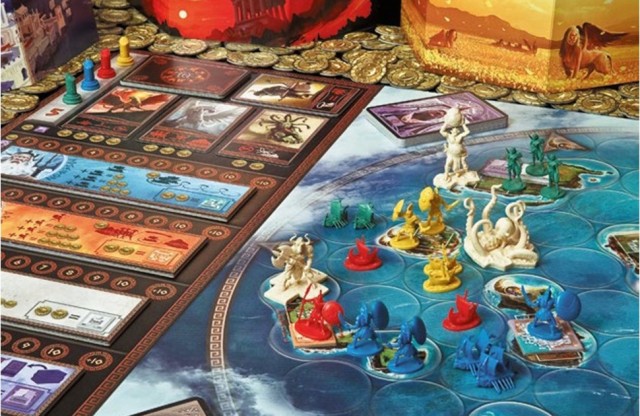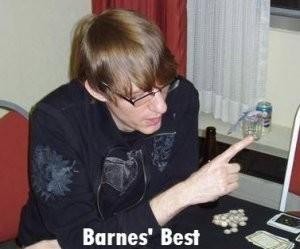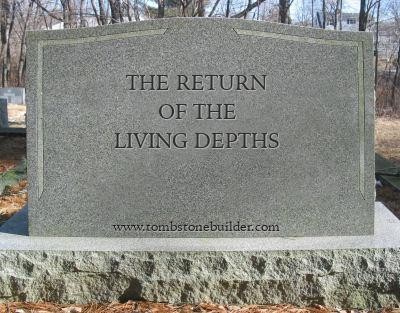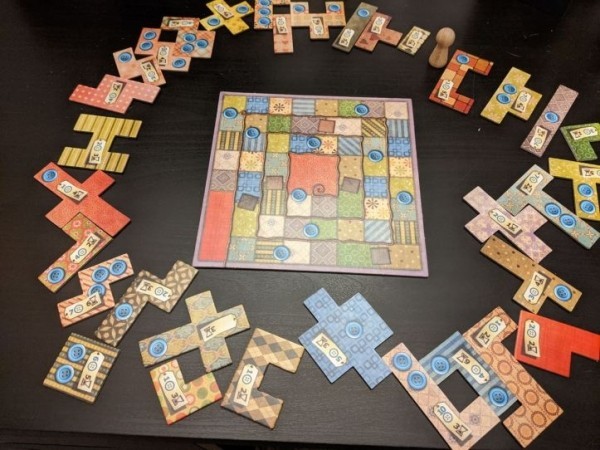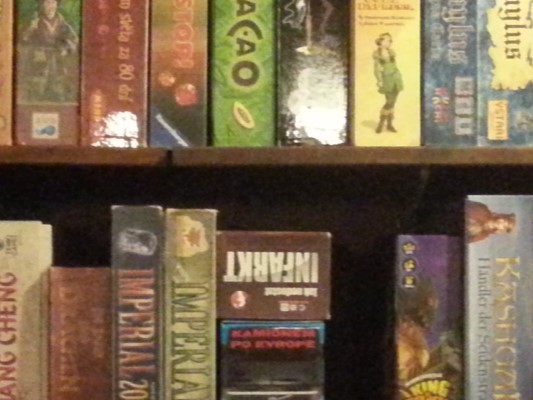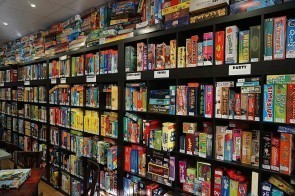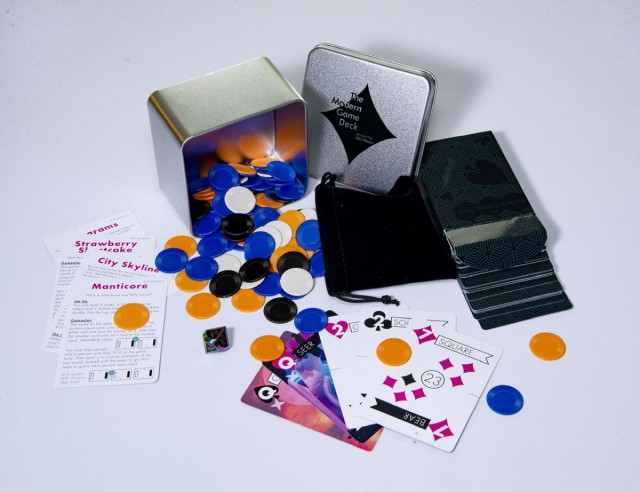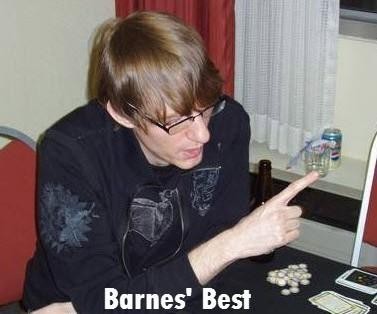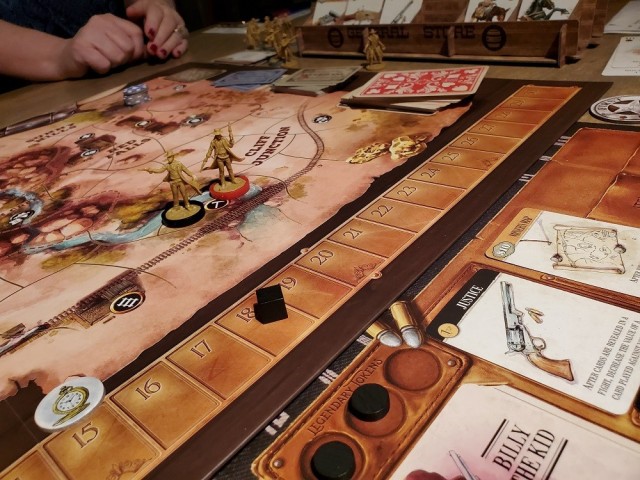#75 Napoleon: The Waterloo Campaign
Part of the reason I do these lists is to give a little bit of limelight to great older games that have fallen off the radar. So it seems fitting to open with one. My copy of this is the 19XX Avalon Hill edition in a silver box, with a mounted board and lovely screen printed blocks. It has a smaller block count than subsequent editions, which only elevates it in my opinion as it makes classic block wargame action fast and tight. The battle system, with two wings and a central column battling for supremacy, is a brilliant chess-like puzzle but with dice.
#74 Codenames
Codenames is perhaps my most played family game. We all love it, as I explained in my Codenames review. It's such a simple idea but one which elevates sideways, creative thinking into an art form. And the puzzling over what clue might have meant what is almost cruel in its fiendish uncertainty. So why the relatively lowly ranking - if the 74th best game ever can be called lowly? Because it just takes too long for one player to keep on coming up with all those amazing clues!
#73 Watergate
Regular readers of my work will know I have a great weakness for card-driven games. It is unfortunate in this time-pushed age, then, that so many are long and complex to the point of making face to face play almost impossible. Watergate circumvents all that, cramming the twists and turns of semi-predictable history that's typical of the genre into an hour, including teaching time. This could rise places over time: I have concerns the shape of the game overall is too scripted, but if I'm wrong then it deserves to go higher.
#72 X-Wing
When this first came out X-Wing was a revelation, and I said so in the review. Those sweet models, the simple list-building, but most of all the achingly tense feel of deep space dogfights with that hidden movement system. It was a staple of my gaming life for a long time as the system expanded and got richer and deeper with cinematic shootouts around huge craft. Sadly, I feel it's collapse under the weight of its ambition now, become a bloated and confusing game of cookie-cutter lists that hasn't been saved by a 2nd edition. But it still deserves a ranking for all those awesome hours of fun.
#71 Agricola
I didn't rate Agricola for a long time. It seemed too much of a typically dry optimisation engine game for my tastes, and it was complex and time consuming to boot. Sure it was a really good optimisation engine game, with lots to chew on and those cool card decks that stopped it being fouled by boilerplate strategy, but it was just a slightly dull game I kept playing because it was popular. Until one game, in a pub, perhaps lubricated by beer, when I saw the joy of actually building a farm under all those efficiency tweaks, and I've enjoyed it ever since.
#70 Dune
As I've explained before, Dune is a game I admire rather than love. But oh, such admiration. There is no better example of a game that evokes so much with so little. Nor of a strongly-franchised game which runs off the usual rails, powering wild and free to thrilling new destinations every trip. Sadly, it collides with the reality of needing six players for an extended period. And even if you can get them, the brutal battle mechanics are so scary that I hardly dare play it.
#69 Hands in the Sea
I had the best time with this deck-building game, based closely on A Few Acres of Snow re-worked to fit the history of the Punic Wars. Over several sessions, I played against the same opponent and it became a strategic arms race, with game plans rising, being tweaked on the fly in a desperate struggle for the win. I'd repeat the games in my head, planning for how to overcome each setback in the next session and thrill with anticipation. I wrote a breathless, admiring review of Hands in the Sea and then ... it just stopped, never to be picked up again. Until I work out why it has to stay at the lower reaches of the ranking.
#68 5 Minute Dungeon
This was a title I picked up to write about for the first edition of The Board Game Book. It's a very simple, real-time, co-operative fantasy game where players have to match symbols on encounter cards to reach and defeat a boss at breakneck speed. What's not to love? Well, very little as it turns out aside perhaps from the light weight. The card art and captions are hilarious, the gameplay frantic and very fun and the whole package is a firm family favourite.
#67 Azul
Just as I over-rated Hands in the Sea when I reviewed it, I sometimes under-rate games too and I did in my Azul review. Not by too much in either case, but the abstract nature of Azul put me off more than it should. Sure, it was lovely to look at and to handle. Sure, it had a surprising amount of meat for the simple rules. Sure, it had a delicious mean streak running underneath that beautiful exterior. But could I really love a game that still had that dry, tasteless edge that's typical of too many abstracts? Yes, as a few more plays teased out, I could.
#66 Band of Brothers: Ghost Panzer
The first game on the list that I covered for Shut Up & Sit Down, Band of Brothers is an unfortunate casualty of the glut of tactical skirmishing titles. It's amazing how well the game replicated the actual infantry tactics of World War 2 with a relatively modest set of fast-playing rules. And it remained a delight and a thrilling tactical challenge every time it saw the table. But long term it lost out to the fun gaminess of Conflict of Heroes and the storied narratives of Combat Commander.
#65 Treasure Island
Sometimes, you can't help but be bowled over by a game in spite of its flaws. Such is the case with Treasure Island as I explained in the review. After a half-dozen games, I'm convinced it's extremely hard for the Long John Silver player to win. And edge cases when you're not sure if a line on a map crosses an important threshold or not are far too common. But my word, the unique concept and evocative piratical thrills of searching for buried treasure by collectively contributing to an actual on-board treasure map remain undimmed.
#64 Here I Stand
This section of this list contains a large number of games that I wish I could find more time for: here is the second and it's the longest of all, a full day. But it's an epic scope for an epic game, a mind-blowing blend of card-driven strategy and on-board manoeuvre and real, intertwined diplomatic concerns instead of just ganging up on the leader. The review I wrote of it is almost as sprawling as the game itself: I hope my style has improved but the game itself doesn't need to.
#63 Terraforming Mars
Heavier engine games aren't generally my cup of tea, but Terraforming Mars is very much a notable exception. Part of it is that there's no doubting that Terraforming Mars is a game about Terraforming Mars, from the corporate factions to the jostling over build space on the planet's surface. That's just the taster to lure you in: beneath there's a rich and fascinating variety of levers to pull and ways to win that's far more interesting than the usual X resources for Y points formula.
#62 Railroad Tycoon / Railways of the World / Steam
Not playing more Railroad Tycoon counts as one of the greatest failures of my gaming life. Whenever the oversize board hits the table, everyone has a great time, but for some reason those occasions are rare. The Railways of England expansion has the ignominy of being the oldest unplayed thing in my collection, over a decade since purchase. I'm using this entry as a placeholder for the whole family: Steam is impressive but it's too hard a taskmaster to get anything other than my respect. Railways of the World is kinder and earns my love as a result.
#61 Twilight Imperium 3
Yet another game I wish I could find time for, and can't. That's why I never dished out for TI4 whatever streamlining it provides, it's still an all-night game that won't see the light of day. But in the olden times when it did, oh boy was it the most anticipated and engrossing game in my collection. The gradual dance across the stars, aligning your production and space fleets and politics and tech tree with your expanding objectives was something very special.
#60 Beyond Balderdash
This is one of only two games from the meagre collection I had before being an in-depth board game hobbyist that's survived into this list. And it's the only mass-market game. A party number where you write down answers to questions, trying to bluff other players as to the right answer, it's full of both hilarious trivia and hilarious moments. I am desperate for my youngest to become old enough, and sly enough, to play.
#59 The Lost Expedition
I love the convenience of this game, that you can pull it out solo, co-op or two-player competitive. I love the cartoon aesthetic and the way the gameplay supports it with every card playing out like the panel in a comic. I love the little expansions and the way they weave in every facet of jungle adventure you can imagine. I'm still not sure how much meat there is in the game, but if there isn't, it's a tasty enough course that I don't really care. All explored in my Lost Expedition review.
#58 Android Netrunner
My collection of cards is not that big, but it's enough that the magic works on the rare occasions I open the box. The asymmetry is breathtaking, the sense that laying cards here and there recreates the feel of a lone runner probing the defences of a giant corporation for secrets. It's enough to play occasionally, and I don't feel the need or have the time to delve into the depth of the metagame. I said as much when I reviewed Android Netrunner after release and, for those of you who do brave the meta, you might enjoy my interview feature on how Project NISEI is keeping it alive, too.
#57 Modern Art
There's a very special group of games at which I am atrociously bad but which I always have a good time playing. And how could you not with this auction game par excellence, where you can sell off paintings using every auction mechanic devised by humanity? It's devious and deeply strategic all at the same time. And the way the mechanics satirise the vagaries and fashions of the art market is just brilliant, a real-life take that's too often absent in game design.
#56 Wallenstein
Wallenstein was perhaps the very first true "waro", a Eurogame that put direct conflict front and centre but ameliorated it with various mechanisms. Even though it's long out of fashion, it's remained a favourite for me even when apparently superseded by games like Inis, Cyclades and Kemet. I prefer it because of its historical setting, its cleaner design and its roots in older games where you could still wheel and deal and hope your borders were secure. The fantastic and still novel cube tower conflict resolution puts the icing on the cake.
#55 Unmatched Battle of Legends
Games that throw the kitchen sink of theme into the box and let you do whatever aren't a favourite of mine. But Unmatched won me over with its gleefully daft match-ups and tense positional and card play. A lot of games come down to what you draw, but managing your deck well and making good use of your minions keeps it fresh and enthralling. Got to review Unmatched for Dicebreaker where the review has certainly been matched by better writers.
#54 War of the Ring
If there’s one thing that can equal my nerdiness for board games, it’s nerdiness for Tolkein. And this game delivers to me on both levels: my own epic version of Lord of the Rings on every playthrough, without ever feeling on rails. One of my few gaming regrets is not ordering a copy of the Collector’s Edition, which I spurned, again, because the length and complexity stop this seeing anywhere near the table time it deserves. I did help someone ship a Collector’s copy to the US, just so I could have it in my hallways and bask in its runic glory for a day or two.
#53 Sekigahara
This block game of Japanese history is divisive in my gaming circles. A couple of opponents have really hated the too common scenario where you can have a board full of blocks and nothing to do with them due to a mismatched hand. I have some sympathies, but on the whole, my message to them is: get a better poker face and bluff on. The relatively easy rules and play time help a lot for the occasional mismatched game. This had an old SUSD review from me, which was a bit over-dramatic.
#52 The Chameleon
Word-based bluffing game the Chameleon hasn’t gone down that well with my gaming friends but it’s an absolute storm with the family. Part of the reason is that we accidentally invented a variant: we have players take turns to think of a word rather than a simultaneous reveal. It makes it a bit easier for the Chameleon to stay hidden but gives the game a delicious slow burn, stops accidental duplicates and makes it oh so satisfying when they’re outed.
#51 Attika
No-one talks about this game anymore, but when I first played this in the early naughties, I was hooked. There’s something about pulling building discs off the draw stacks, hoping to catch a break and get what you need, that needles you with that gamblers addiction. And there’s a constant tension between placing the discs to score you points or to interfere with your opponent’s plans to do the same. It’s by far at its best with two, and I wonder if chaotic games with more players lead to it being so quickly forgotten.
 Games
Games How to resolve AdBlock issue?
How to resolve AdBlock issue? 